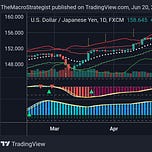In “Japanese Treasury Flows Signaling Eurodollar Trouble,” I went over why Japan was unloading hoards of treasuries back in 2022.
Of course, the market's natural inclination was to pose this selling as Japan simply finding U.S. treasuries unappealing. However, if you understand a few things you can see through that narrative.
“This is important because 1) Tokyo is a huge eurodollar system hub 2) The PBOC cannot liquidate large amounts of their Treasury holdings due to structural balance sheet issues.”
Why the above is important is because when I wrote this in March 2022, the yen and Chinese yuan started weakening substantially; and it all surrounds the dollar-funding stress as interest costs rise.
Japanese banks, funds etc. swap their yen into dollars in order to buy more appealing assets, or they then lend those borrowed dollars, particularly Chinese.
When rates rise, it makes these dollars borrowed by China more costly to hold, but it also makes those that lent the dollars to knock on the Japanese institution's door looking for more collateral - usually Jbills. When it gets under significant stress, these dollar lenders want their dollars. Javanese institutions are then forced to sell their dollar assets (same goes for China on the other end).
This is happening to Norinchukin Bank.












